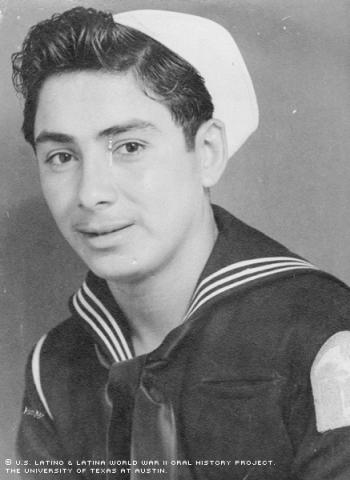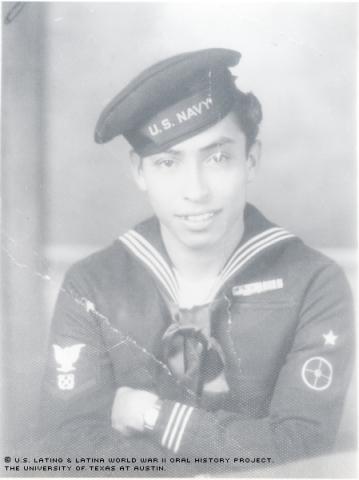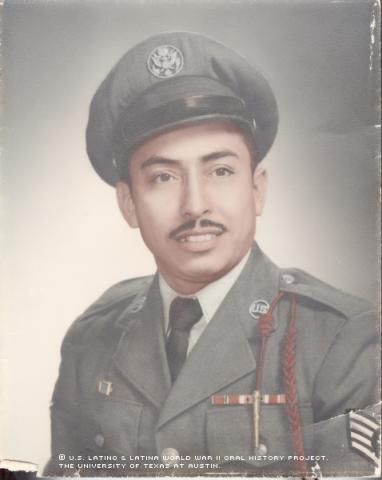


By Mark Lavergne
Donning a green flight jacket and a black hat emblazoned in gold capital letters with the words "Purple Heart," 78-year-old Concepción Pompa looks like a retired man able to indulge in his memories.
But that relaxed image belies a storied 40-year military career highlighted by a tour of duty in the South Pacific. Pompa started his military career when he volunteered for World War II, beginning a record of faithful service.
Born Dec. 8, 1923, in Devine, Texas, Pompa grew up in a Chicano community that was isolated from other ethnic minorities and Caucasians. His father owned a barber shop but was forced to close it in the midst of the Great Depression. As a result, the Pompas had to leave their city to find work in the picking fields of South Texas.
When Pompa was 17 years old, he joined the Civilian Conservation Corps to help his unemployed parents and family. The government established the corps during the Great Depression to assist impoverished families in supporting themselves financially. After an initial stint in Houston, he was assigned to another corps camp in Springdale Utah, where trails were established for a developing national park.
Pompa recalled having first heard of the attack on Pearl Harbor the day after it occurred -- on his 17th birthday, Dec. 8, 1941.
"I heard over the radio that Pearl Harbor had been bombed. And so they closed the camp, and the people [who were] 21 years old automatically went to the Army," Pompa said. "And me and Ernest Pompa, a cousin a mine, it took us three days to discharge from Utah to Texas."
In October of 1942, Pompa volunteered to join the war effort. He joined the Navy, and spent his first three weeks of service in San Diego before being shipped overseas to Pearl Harbor.
"My first duty there was picking up bodies from [sunken battleships] the Oklahoma and the Arizona. They would turn loose from their compartments and come up in the water and float to the side of the harbor," recalled Pompa, also noting that bodies were still floating to the surface of the water almost a full year after the attack on Pearl Harbor.
"They [corpses] would turn loose and they would swell up like a balloon and they would float down to the end of the beach," he said, recalling riding in a motorboat to fetch the bodies, using a rubber hook to keep them intact, then shipping them off for burial.
And then there was the environmental degradation.
"The sea was plumb black. You could get your hand like that," he said, cupping his hand, "and pick up all the oil, you know, that would turn loose from the ships, all the oil. It took almost two years before they cleared all the oil outta there."
Pompa’s next assignment was to prepare airfields.
"Every month they would ship me to a different island to set up a beach where the aircraft could land," he said. "My job was from island to island, setting up beaches. When they would take over an island, we had to go there and set up so the rest of personnel would come in and land the aircraft."
In 1944, Pompa went home. While he made it back, an older brother was serving in the Philippines and another brother was headed for the South Pacific to begin his own tour of duty.
"We could talk from ship to ship with a bullhorn," he said. "And I was talking to him. I was coming home, and he was going in."
That year, Pompa enrolled in a GI school, where he spent two years learning aviation mechanics and one year in welding. Eventually promoted to Technical Sergeant in the 149th Consolidated Aircraft Maintenance Squadron, Texas Air National Guard at Kelly Air Force Base, Texas, he was cited by the military for meritorious service in his field from Oct. 14, 1942 to Jan. 3, 1946.
By the 1950s, "when Korea broke open," Pompa was still in the reserves, performing duties in structural repair. In a citation that accompanied a Texas medal of merit, he’s acknowledged for his expertise – particularly, his assistance and suggestions in handling engine modifications related to the 100-seris aircraft.
But while his star rose, a close comrade's life was snuffed out. Within a year of the war breaking out, his brother-in-law was killed in Korea.
"He got burned up by a flame thrower," Pompa recalled. "They sent the Purple Heart to his mother."
During the Vietnam War, Pompa was stationed at Kelly Air Force Base in San Antonio. He was sent in 1968 to Cam Rahn Bay for his first tour in Vietnam as a welder. On August 23, 1972, he was wounded in the early morning as he slept.
"It was about five in the morning when the ruckus started coming in and I was sleeping in my barrack," he recalled. "And one of the rockets had hit a barrack where I was sleeping, and blew me outta the building, and all this crap got into my back . ... I lay there for a while until some of my friends that were there with me kinda picked me up and said, 'You got your back all bloody.' They spent like two hours taking all this stuff outta my back."
A second tour of duty in Vietnam began on August 23, 1972 in Bien Hoa, where he worked as a welder adviser. He was awarded the Purple Heart during this stint.
Technical Sergeant Pompa retired at last on Dec. 8, 1983, ending a distinguished military career spanning four decades.
Despite the horrors he encountered, he has managed to live more or less a normal life since his return. He’s the vice commander of the Veterans of Foreign Wars post in Devine, which has more than a hundred members.
Long after the war, accolades keep coming, this time for aspects of his post-war life. As a longtime member of the St. Joseph Catholic Church Knights of Columbus in Devine, he was recently given a certificate of service.
The church recognized his 40 years as a parishioner, the same length of time he gave to his country.
Mr. Pompa was interviewed in Devine, Texas, on January 5, 2002, by Maggie Rivas Rodriguez.

